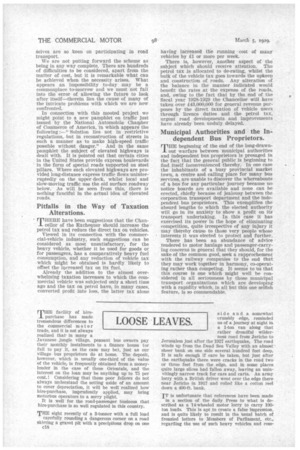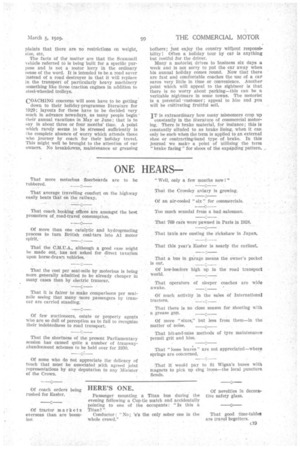T HE facility of hirepurchase has made tremendous differences to the
Page 40

Page 41

If you've noticed an error in this article please click here to report it so we can fix it.
commercial motor trade, and it is not always realized that in many a Javanese jungle village, peasant bus owners pay their monthly instalments to a finance house (or fail to pay it, as the case may be), just as our village bus proprietors do at home. The deposit, however, which is usually one-third of the value of the vehicle, is frequently obtained from a moneylender in the case of these Orientals, and the interest on the loan may be anything up to 75 per cent.! Considering that these poor fellows do not always understand the setting aside of an amount to cover depreciation, it will be well -realized how hire-purchase, imprudently applied, may bring motorbus operators to a sorry plight.
It is well for the road-passenger business that hire-purchase is so well regulated in this country.
THE sight recently of a 3-tonner with a full load carefully rounding a dangerous corner on a road skirting a gravel pit with a precipitous drop on one ciS side and a somewhat crumbly edge, reminded us of a journey at night in a 1-ton van along that rather dreadful wilderness road from Jericho to Jerusalem just after the 1927 earthquake. The road winds up from the Dead Sea Valley with an almost sheer bank on one side several hundred feet deep. It is safe enough if care be taken, but just after the earthquake there were cracks in the road two or three feet from the edge, and in some places quite large slices had fallen away, leaving an utdavitingly narrow track for cars and carts. An army lorry with a British driver went over the edge there near Jericho in 1917 and rolled like a cotton reel down a 400-ft. bank.
IT is unfortunate that references have been made in a section of the daily Press to what is described as a 14-wheeled motor lorry to carry 100ton loads. This is apt to create a false impression, and is quite likely to result in the usual batch of frenzied letters to Members of Parliament, etc., regarding the use of such heavy vehicles and corn plaints that there are. no restrictions on weight, size, etc.
The facts of the matter are that the Scanunell vehicle referred to is being built for a specific purpose and is not a motor lorry in the ordinary sense of the word. It is intended to be a road saver instead of a road destroyer in that it will replace in the transport of particularly heavy machinery something like three traction engines in addition to steel-wheeled trolleys.
COACHING concerns will soon have to be getting (limn to their holidaysprogranune literature for 1929; layouts for these have to be decided very much in advance nowadays, as many people begin iheir annual vacations in May or June; that is to say in about three or four months' time. A point which rarely seems to be stressed sufficiently is the complete absence of worry which attends those who journey by coach for their holiday travel. This might well he brought to the attention of car owners. No breakdowns, maintenance or greasing bothers; just enjoy the country witbout responsibility! Often a holiday tour by car is anything but restful for the driver.
Many a motorist drives to business six days a week and is not sorry to put the ear away when his annual holiday comes round. Now that there are fast and comfortable coaches the use of a car saves very, little in time or convenience. Another point which will appeal to the sightseer is that there is no worry about parking—this can be a veritable nightmare in some towns. The motorist is a potential -customer; appeal to him and you will be cultivating fruitful soil.
IT is extraordinary how many misnomers cropup constantly in the literature of commercial motoring. There is brake material, for instance; this is .constantly alluded to as brake lining, when it can only be such when the term is applied to an external shoe or contracting-band type of. brake. In this journal we mákn a point of Utilizing the term " brake facing" for shoes of the expanding pattern.












































































































